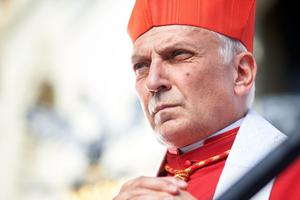Wyszyński, John Paul II and Reagan Saluted as ‘Knights of Liberty’
These three men contributed, both individually and jointly, to the overthrow of communism behind the Iron Curtain in Europe.

Blessed Stefan Cardinal Wyszyński, Pope St. John Paul II and President Ronald W. Reagan were all described as modern “Knights of Liberty” for their roles in bringing down European communism in the 1980s and 90s during an international conference at the Victims of Communism Memorial Museum in Washington on March 23.
Panelists from the United States and Poland spoke about how the three men contributed, both individually and jointly, to the overthrow of communism behind the Iron Curtain in Europe. Major speakers included papal biographer George Weigel, Member of the European Parliament Ryszard Legutko, and Bishop Sławomir Oder who, as postulator, handled John Paul’s canonization process. Other panelists included Janusz Kotański, Poland’s former ambassador to the Vatican; Profs. Zbigniew Stawrowski, Paweł Skibinski, John Radziłowski, Marek Chodakiewicz, Henry Nau, John Lenczowski, Lee Edwards, Paul Kengor, Ambassador Paula Dobriansky, Clark Judge, Eric Patterson, Anthony Eames, and Victims of Communism Memorial Foundation (VOC) faculty and staff, including VOC Chairman, Dr. Elizabeth Spalding, CEO, Ken Pope, and President, Ambassador Andrew Bremberg.
Wyszyński, who became Archbishop of Gniezno and Warsaw (and thus Primate of Poland) in 1948, assumed his post as communism in its postwar, Stalinist phase was stamping out all political pluralism in Poland. Seeing that Western recognition of the Yalta division of Europe was not going to be reversed, Wyszyński sought to carve out what space he could for the Church within the status quo. When the communists in 1953 claimed the right to make all ecclesiastical appointments, from parish priests on up, the Primate led the bishops’ collective declaration Non Possumus (“we cannot agree”), which landed Wyszyński under isolated house arrest for three years. During the time, the Primate prepared his spiritual strategy, including a nine-year novena to lead up to the millennium of Polish Christianity in 1966, which led to the recatechesis of the country.
Pope John Paul II who, as Karol Wojtyła served as Archbishop of Kraków for 14 years alongside Primate Wyszyński. Despite relentless communist efforts to divide the two, Wojtyła maintained loyal solidarity with Wyszyński. On Oct. 22, 1978, as cardinals processed up to the new Pope to declare their homage, John Paul got up and raised Wyszyński, embracing him. The next day, the new Pope declared, “This Polish pope, who today full of fear of God, but also of trust, is beginning a new pontificate, would not be on Peter’s Chair were it not for your faith, which did not retreat before prison and suffering.”
Reagan, who narrowly lost the Republican presidential nomination in 1976 and was expected to run in 1980, had already formulated a principled anti-communism, based not on political expediency but a moral assessment of the “evil empire.” Watching John Paul’s first pilgrimage to Poland in June 1979 — “nine days that changed the world,” as papal biographer George Weigel described it — Reagan became convinced Poland was the linchpin in bringing down the Soviet Empire and that he needed to work with the Pope towards that goal. His intention was reinforced by his conviction that both his and John Paul’s survival of assassination attempts in 1981 were part of a “divine plan” to pursue that goal.
All the speakers emphasized that, while their goals were clear, Wyszyński, John Paul and Reagan were also all realists who recognized that, while their end might be long-range, their means should always focus on expanding liberty for the captive nations while never compromising on freedoms won. All of them saw the struggle against communism not as a political or economic one but fundamentally as a moral struggle for freedom and human rights. For that reason, none of them parsed words in speaking the truth about communism or defending the rights of peoples subjugated by it.
Winsome Sears, the Lieutenant Governor of Virginia, made a surprise appearance. The conference ended with a discussion about challenges of defending freedom and explaining communism to young people — the “post 9/11 generation” — today.
The Victims of Communism is an educational, research and human rights nonprofit foundation established to keep alive the memory of communism’s historical record, continue the struggle for freedom in countries still under the Marxist yoke, and to memorialize the more than 100 million victims murdered by communism since 1917, including by collecting victims’ testimonies. It has opened a museum to the victims of communism at 900 15th Street Northwest in Washington and erected a memorial — modeled on the Tiananmen “Statue of Liberty” from 1989 — near Union Station in the capital.
The conference was organized by Monika Jabłońska, VOC Senior Fellow at the VOC, and the Victims of Communism Memorial Foundation in partnership with the Polish National Foundation.

















